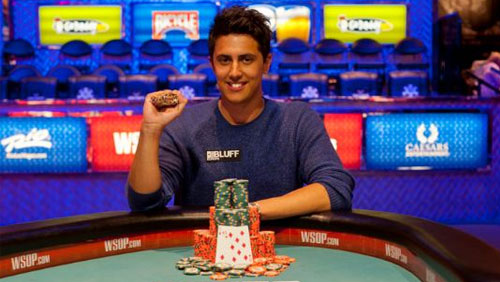Lee Davy sits down with the World Series of Poker bracelet holder, Craig McCorkell, to talk about the feasibility of a pro poker player returning to a $40k per year desk job; how the break even brigade survive; corporate puppets, and much more.
 A little tip for would be interviewers.
A little tip for would be interviewers.
When selecting people to interview, choose people like Craig McCorkell.
The World Series of Poker (WSOP) bracelet holder is his own man. If he has an opinion, he will share it, no matter how controversial it may be. That’s good news. It means you can produce interviews that are interesting to read, instead of your usual cut and paste type Q&A that’s not fit to wipe your ass.
The poker world needs more Craig McCorkell’s.
Here he is talking about pretty much anything that I fire his way.
How difficult would it be for a professional poker player to return to a £40,000 a year desk job?
“I don’t think it’s the money…it would be the lifestyle change that would be tough. Being told what to do; sitting at a desk all day, and having to change your hours. It would be an incredibly different lifestyle than the one we lead right now. It’s not really a financial issue although you would have to pay tax!”
Talking about tax. It’s going to come to people in the UK someday right?
“I think maybe it will, although the UK has a unique attitude towards gambling because of our history with it. I think they are more concerned about keeping the gambling industry running, and taxing those that run it, rather than people who are gambling; hence the implementation of the Point of Consumption tax.”
But if people keep winning $10m prizes won’t attention be drawn to the pro player?
“Maybe if someone British had won it that may have happened. We need to remember that $10m wins are few and far between. They want people to gamble and so we should be alright.”
You said that the poker lifestyle is great. Is this why so many players who are broke or breaking even find it so difficult to leave?
“Definitely, the lifestyle is great, you adjust to it, and it’s very appealing. I see people breaking even in poker all the time and they are happy because of the lifestyle.”
But what do these people do for money? How do they even buy a packet of crisps?
“I don’t know…that’s a good question. The comfortableness and freedom is extremely appealing though. People who don’t play poker would find that very appealing. If you are traveling to Australia, the US, and South America, it’s not a bad life is it?
“A lot of people in this position are backed. They are racking up make up, living off FPPs, they have loans, or their backer will give them some money. It’s an inexpensive lifestyle. If you are just staying at home playing online poker, you just need a little bit of food and you will be ok.”
Dan Colman recently called Phil Hellmuth a few names and then admitted to multi-accounting in his younger days. Big story or average news?
“I think what Dan said is a big story. It’s an interesting opinion to have. He was probably annoyed by some of the comments these guys came out with due to his decision not to speak out after winning the bracelet. I think his points are valid.”
Is the divide between the younger and older generation getting wider?
“I think it’s mostly people who are puppets for large corporations. People like Negreanu, who used to be very vocal, and a spokesperson for the people. His last blog post was a bit embarrassing {supporting Stars rake changes}. When people change as much as that, that’s what people get frustrated at. I can see Dan getting annoyed at something like that.”
Are we going to see less young poker players wanting to do interviews with the media because of Colman’s approach?
“I hope that doesn’t happen. PokerStars used to do so much work for poker. They earned a lot of money, but they cared about the game. So I hope the interaction remains in situ.”
And his admission to multi-accounting?
“Obviously, that’s a terrible thing to do. Everyone makes mistakes when they are young. It’s also a moral issue. I can see how you can do that when you are younger and not realize how bad it is. At least he has admitted it. It’s nice to see someone make it to the top and have his own voice. Even if what he says is not right at least he has his own opinion.”